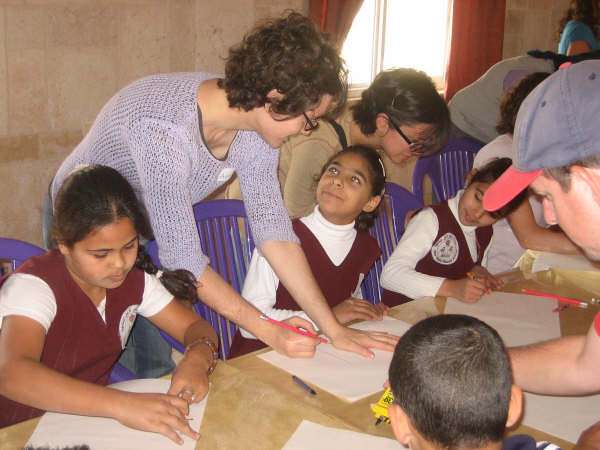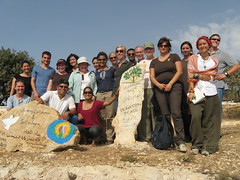Today on Facebook I saw a beautiful picture. It was a picture of the village of Buqayah, in the Northern Galilee. My friend Hanna was from there.
Even now when I think of destroyed villages, hundreds of destroyed villages, I think of scattered houses, shacks, tin-roofed barns, like Bedouin communities. There's an emotional detachment to those images, and legal uncertainties about land ownership, and if and when the paperwork changed with the regime....
But you see an image like this and it's so scenic, it's like a movie. It's colorful. Nurit Peled-Elhanan really had a point when she talked about Israeli schoolbooks and the depictions of Arab life as colorless, or brown and yellow.
Look at this picture!
It looks like a screenshot from a movie...about the Holy Land. This is the Galilee. And this community was forcibly re-written. How can that be Holy?
Here's a description I found from the document linked below:
Hanna is from the village of Buqayah, in the Upper Galilee inside Israel
Proper. On the maps of Israel the village is called Peqiin, or Ancient Peqiin,
because New Peqiin is now a Jewish settlement built on land originally part of
Buqayah. The village has been inhabited for millennia and, recently, a cave was
discovered with ceramic coffins, skeletons, and artifacts that date back seven
thousand years. Hanna grew up there, in a small community of five different
religious groups: Catholic, Greek Orthodox, Druze, Jewish, and Muslim.
-------
I first met Hanna at a coffee shop in Wallingford, a Seattle neighborhood. I was meeting with Ed Mast, a long-time Seattle activist who got the "End U.S. to Israel" bus ads put up. Ed had met his wife while they were ISM activists in Palestine. Ed reminded me of my politics professor at Whitman. I liked Ed.
His friend Hanna was there too, and when Ed took off, I found myself alone facing Hanna, going "umm...hey, so...where you from?"
We ended up talking for two hours. I didn't know much about the situation of Palestinians with Israeli citizenship. Some call them Israeli Arabs, some call them '48 Palestinians, they're often exploited to prove that Israel is a democracy. I mentioned that to Hanna and he said, "you want proof? I'll give you proof..." and he listed off several ways the system discriminates against non-Jews. I remember one: he has a number zero at the beginning of his ID number that sets him apart from Jewish Israelis. There were many others, anyways, I learned a lot from Hanna, and found out he spearheaded the Team Palestine soccer team in Seattle. I filmed them practicing and playing at the All Nations tournament in Tukwila a few weeks later.
After I saw the picture of his village, I went back and Googled Buqayah. I found Hanna and Ed's theater project about a destroyed village. Their play actually got a lot of exposure. Read this....it's an amazing story.
The play, titled Sahmatah, was performed in Seattle and around the Pacific
Northwest in 1996. In 1998, Sahmatah traveled to Israel/Palestine, to be performed
on the actual stones of the village itself.
The project began five years ago.
The story of Sahmatah
Also, check out the movie The Time That Remains. It's about a Arab family from Nazareth, from 1948 to today, and it's fantastic.
Even now when I think of destroyed villages, hundreds of destroyed villages, I think of scattered houses, shacks, tin-roofed barns, like Bedouin communities. There's an emotional detachment to those images, and legal uncertainties about land ownership, and if and when the paperwork changed with the regime....
But you see an image like this and it's so scenic, it's like a movie. It's colorful. Nurit Peled-Elhanan really had a point when she talked about Israeli schoolbooks and the depictions of Arab life as colorless, or brown and yellow.
Look at this picture!
It looks like a screenshot from a movie...about the Holy Land. This is the Galilee. And this community was forcibly re-written. How can that be Holy?
Here's a description I found from the document linked below:
Hanna is from the village of Buqayah, in the Upper Galilee inside Israel
Proper. On the maps of Israel the village is called Peqiin, or Ancient Peqiin,
because New Peqiin is now a Jewish settlement built on land originally part of
Buqayah. The village has been inhabited for millennia and, recently, a cave was
discovered with ceramic coffins, skeletons, and artifacts that date back seven
thousand years. Hanna grew up there, in a small community of five different
religious groups: Catholic, Greek Orthodox, Druze, Jewish, and Muslim.
-------
I first met Hanna at a coffee shop in Wallingford, a Seattle neighborhood. I was meeting with Ed Mast, a long-time Seattle activist who got the "End U.S. to Israel" bus ads put up. Ed had met his wife while they were ISM activists in Palestine. Ed reminded me of my politics professor at Whitman. I liked Ed.
His friend Hanna was there too, and when Ed took off, I found myself alone facing Hanna, going "umm...hey, so...where you from?"
We ended up talking for two hours. I didn't know much about the situation of Palestinians with Israeli citizenship. Some call them Israeli Arabs, some call them '48 Palestinians, they're often exploited to prove that Israel is a democracy. I mentioned that to Hanna and he said, "you want proof? I'll give you proof..." and he listed off several ways the system discriminates against non-Jews. I remember one: he has a number zero at the beginning of his ID number that sets him apart from Jewish Israelis. There were many others, anyways, I learned a lot from Hanna, and found out he spearheaded the Team Palestine soccer team in Seattle. I filmed them practicing and playing at the All Nations tournament in Tukwila a few weeks later.
After I saw the picture of his village, I went back and Googled Buqayah. I found Hanna and Ed's theater project about a destroyed village. Their play actually got a lot of exposure. Read this....it's an amazing story.
The play, titled Sahmatah, was performed in Seattle and around the Pacific
Northwest in 1996. In 1998, Sahmatah traveled to Israel/Palestine, to be performed
on the actual stones of the village itself.
The project began five years ago.
The story of Sahmatah
Also, check out the movie The Time That Remains. It's about a Arab family from Nazareth, from 1948 to today, and it's fantastic.











